
Iran's Ahmadinejad at nuclear facility (archives)
צילום: AP
Iran defiant, but Russia against oil sanctions
Washington Post quotes Iranian officials as saying proposals submitted to world powers offer cooperation on Afghanistan, fighting terrorism and global system aimed at eliminating nuclear weapons, but not talks on Tehran's own nuclear program. Lavrov: Sanctions not mechanism to force Iran to cooperate
Iran defied Western powers on Thursday and ruled out talks on its nuclear program, but still looked set to escape the threat of oil sanctions with Russia saying it would not back such measures at the United Nations.
Western powers are becoming frustrated by what they have called Tehran's "persistent defiance and point-blank refusal" to suspend its uranium enrichment and its avoidance of negotiations as demanded by UN Security Council resolutions since 2006.
US President Barack Obama has indicated Iran will face much harsher international sanctions, possibly targeting its lifeblood oil sector, if it does not accept good-faith negotiations by the end of September.
But Russia said a package of proposals Iran submitted to world powers on Wednesday contained something to work with and ruled out oil sanctions against the Islamic Republic. Russia has veto power in the UN Security Council.
Comments by Tehran's envoy to the UN nuclear watchdog and US reaction signaled that Tehran's proposals did not deal directly with Iran's own atomic activities that the West suspects are geared towards making a nuclear bomb.
"Tehran is prepared to have fair and substantive talks about various problems, including the guarantee of access by all countries to nuclear energy and preventing the proliferation of nuclear arms," Iran's Arabic-language satellite television, al Alam quoted envoy Ali Asghar Soltanieh as saying.
"But these talks do not include Tehran's nuclear program and legal activities in this connection," he said.
Iran's proposals to the United States, Russia, China, Britain, France and Germany offered cooperation on Afghanistan, fighting terrorism and oil and gas collaboration as well as a global system aimed at eliminating nuclear weapons, an Iranian official told the Washington Post.
'Step to a full blown blockade'
The United States said the proposals were "not really responsive to our greatest concern, which is obviously Iran's nuclear program".
US State Department spokesman P.J. Crowley told reporters: "In the package yesterday, Iran reiterated its view that as far as it is concerned, its nuclear file is closed."
But Russia was more responsive to Iran's proposals.
"Based on a brief review of the Iranian papers my impression is there is something there to use," Russian Foreign Minister Sergei Lavrov told reporters in Moscow.
"The most important thing is Iran is ready for a comprehensive discussion of the situation, what positive role it can play in Iraq, Afghanistan and the region," he said.
Iran, the world's fifth biggest crude producer, denies it wants to develop a nuclear arsenal and says it only needs atomic energy to generate electricity to meet the demands of its growing population and maximize oil and gas exports.
The Islamic Republic is seen as being vulnerable to oil sanctions as it has to import some 40 percent of its gasoline to supply the cheap fuel that Iranians see as their birthright.
But Lavrov said world powers had agreed to use sanctions only as a way to get Iran to cooperate with the International Atomic Energy Agency in its monitoring of Iran's nuclear work.
"Some of the sanctions under discussion, including oil and oil products, are not a mechanism to force Iran to cooperate -- they are a step to a full blown blockade and I do not think they would be supported at the UN Security Council," he said.
The UN Security Council has attempted to persuade Iran to suspend the enrichment of uranium which can be used in either power plants, or if purified further, in a nuclear warhead.
The six powers offered Iran trade and diplomatic incentives in 2006 in exchange for a suspension of enrichment, but Iran ruled out such a move as a precondition for talks.
They improved the offer last year but retained the precondition. Iran said it wanted a broader peace and security deal, dismissed by Western officials as vague and irrelevant.
Diplomats say Western officials have suggested a face-saving way into talks could be a verified freeze in enrichment expansion, with suspension still the goal in exchange for benefits to Iran. But Tehran has ruled out any such freeze.










